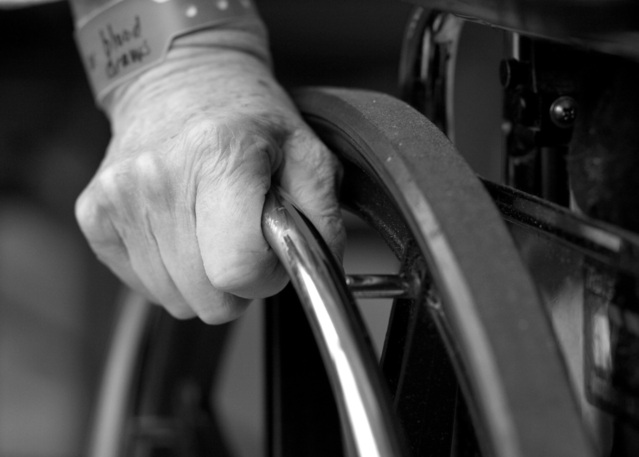R N Bhaskar
9 February 2015
On 23 January 2014, this author received a letter from the “Court of Chief Commissioner for Persons with Disabilities” informing him that his case had been “closed”. He had complained about the railways not being responsive to his oral and written requests for information on how a disabled person should apply for benefits he/she was eligible to receive.
The curt letter did not mention anything about any action taken against the errant railway officials who ignored the request for information for almost a year. There was not even a note of apology or regret.
That apology was sorely needed. After all, when a government department — paid for by taxpayers — does not heed to oral and written requests made in October 2013, and replies only when directed by the court in August, 2014, someone needs to be pulled up. The need for an apology becomes all the more urgent when even the board which is supposed to look after the welfare of disabled persons chooses to remain silent.
This author is convinced that even this curt reply was the result of the new government’s insistence on a transparent method of registering complaints (and monitoring redressal) through the website. Not surprisingly, a complaint registered in June finally elicited a response in August — but without the apology — yet almost collusively protecting errant officials.
There is another aspect as well. The railways distorts rules to disfavour the disabled.
The central government’s income tax department has a transparent manner of defining “disability”. Under Section 80U, the income tax rules state that “In case of Person with Disability (at least 40%) Rs50,000 is allowed. In case of Person with Severe Disability (80% of one or more disabilities) Rs1,00,000 is allowed”. The percentage of disability is decided by a competent government doctor in specified institutions. This has now been computerised, so that the government has a central registry of people who have been certified as being disabled.
The railways has instead chosen to adopt rules that allow for tremendous discretionary powers, hence amenable to more corruption and harassment. They state that concessions for orthopaedically disabled persons are available to only “100% orthopaedically handicapped persons who can travel with escort”.
Does this mean that a person who has lost both lower limbs but has learnt to walk with crutches and artificial limbs is no longer “disabled” and hence not eligible for benefits? Does a person have to roll on the ground and be humiliatingly supported by an escort in order to avail of benefits from the railways? Isn’t the administrative creation of such a rule the product of a disabled mind in an otherwise able body? Is there nobody to question such perverse interpretations?
There is worse to come. The railways wants every trip to require a fresh certificate, even though the hospital may have declared the person to be “permanently disabled”.
Nobody seems to bother about the fact that even to get a disability certificate; a person has to visit a government hospital anywhere between 6-10 times. Many disabled persons are daily wage earners, or persons who cannot get leave easily, and hence have to forgo wages. To demand a certificate each time a disabled person has to travel is thus adding insult to injury.
Do the railways officials know what it means to be disabled and being made to run around to hospitals for each trip? Are railway administrators blind to a humane interpretation — like those of the Income Tax Act?
Countdown to a closure
- Sept 24-28 2013
Action Phone calls to railways requesting information.
Response: Always informed that officials not available - Oct 9, 2013
Action Email sent. Letter sent, acknowledgement received.
Response: No reply - Dec 5, 2013
Action Reminder emails to Kumari Selja-Minister for Social Justice & Empowerment, Prasanna Kumar Pincha-Chief Commissioner for Persons with Disabilities, Atul Rane, cpro, Central Railways, AK Jain, Senior PRO, Railways
Response: No response - May 2014
Action New government assumes power - 2014 Jun 17
Action Complaints registered both on portals of railways complaints and public grievances - Aug 25, 2014
Action Informed by email and sms by “Department of Disability Affairs” under ref DODAF/E/2014/00065 that since railways has replied, case closed
Response: Protest registered. Why have officials not reprimanded for delay. And why no apology (Complaint no. MORLY/E/2014/09054) - Aug 26, 2014
Action Speed-post letter from Railways informing that disability concession only for “100% orthopaedically handicapped persons who can travel with escort”. - Aug 26, 2014
Action Challenge the closure of case through website
Response: Asked to register another complaint on Social Justice and Empowerment portal (MOSJE/E/2014/00461), and then redirected to Department of Disability Affairs - Nov 11, 2014
Action Phone call from Department of Disability stating that papers misplaced. Fortunately, all complaints carefully preserved by complainant and sent to the officer. - Jan 22, 2015
Action Letter dated 22 Jan 2014 received from Chief Commissioner of Court of Disabilities (Case No. 2702/1103/2014) informing that case closed because complainant had already been informed by the railways on August 26 2014 about procedures.
Response: No mention abut penalising railways for delay, or apology, or change in norms - There are similar signs of callousness everywhere. When the railways provide compartments for the disabled, they are without ramps which could help the disabled board or alight from the train. There are almost no toilets for the handicapped — in fact, there aren’t enough toilets even for the able-bodied.
Look at the overbridges, needed for navigating from one platform to another. Hardly any station has an elevator or an escalator or a vehicle for the disabled, except (maybe) where new metro trains are being introduced.
The railways is obviously hostile to the disabled. It appears to have touched the nadir of human sensitivity.
But then, the disdain for the disabled is in evidence almost everywhere. Look at city planners. You have skywalks and subways that the disabled cannot use easily, as they have been constructed without escalators. You have pavements that usually end abruptly, without any slope to allow the old, the feeble and the disabled to climb up or down without the risk of falling and hurting themselves.
Mercifully, the airlines have wheel chairs and vehicles for the disabled. Possibly, frequent exposure to other countries has compelled them to become disabled-friendly. Or could it be that users of aeroplanes are usually from the more privileged sections of society? And nobody dares rub the privileged the wrong way.
It is then that one realises that India is no country for the disabled, the feeble and the old.
The author is consulting editor with DNA.
Read the original article here.
Click here to read more on India and its policies.




































COMMENTS